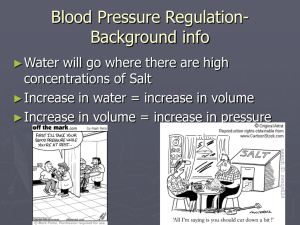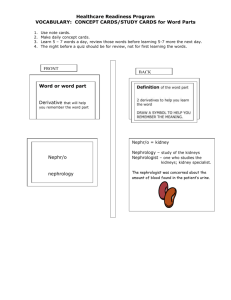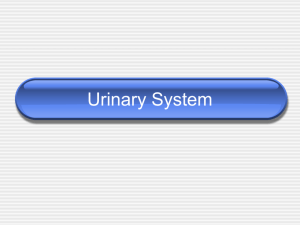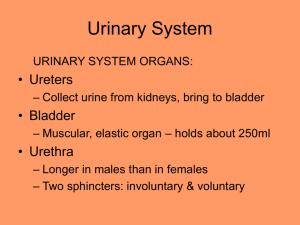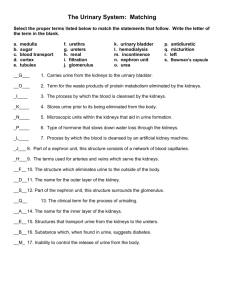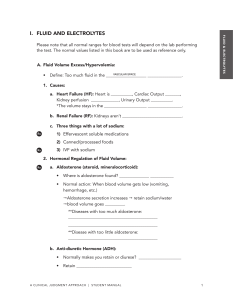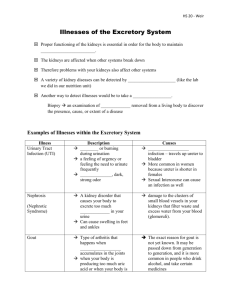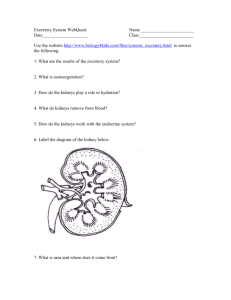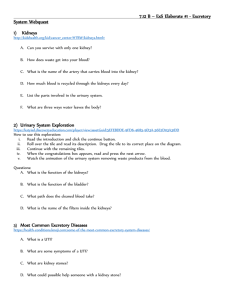Balance and Hormones in Kidneys
advertisement
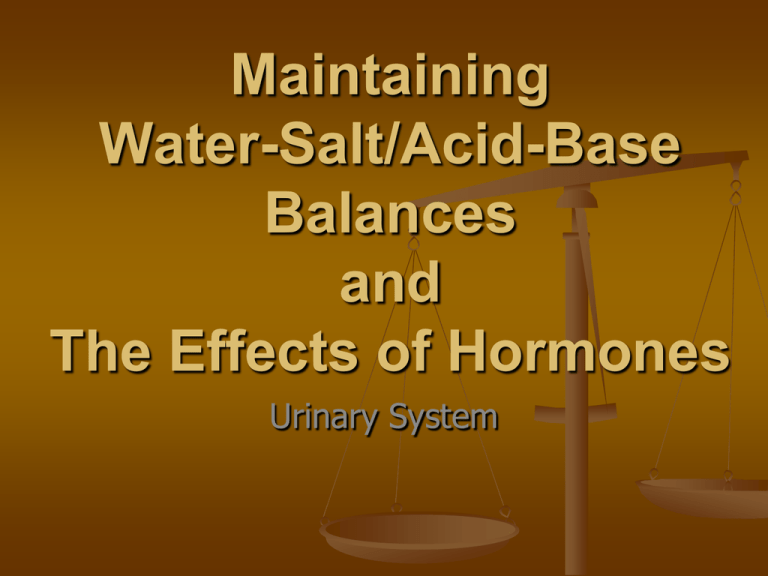
Maintaining Water-Salt/Acid-Base Balances and The Effects of Hormones Urinary System Control of Blood Composition Kidneys filter 150-180 liters of blood plasma AND only produce 1-1.8 liters of urine in 24 hours Composition depends on 3 factors 1. 2. 3. Diet Metabolism Urine output Blood Composition Kidneys play an important role in keeping blood composition constant 1. 2. 3. Excretion of Nitrogen-containing wastes like urea, uric acid, and creatinine Maintain water and electrolyte balance Ensure blood pH 7.35-7.45 Maintain water and electrolyte balance Water accounts for 60% of body weight in females and 50% in males Water locations in body: 1. 2. 25 Liters in Intracellular Fluid – contained in living cells 15 Liters in Extracellular Fluid – all body fluids outside of cells a. b. 12 Liters in Interstitial Fluid: Tissue Fluid, Cerebrospinal Fluid, Serous Fluid, humors of eye, lymph 3 Liters in Blood Plasma Maintain water and electrolyte balance Intake and Output of body water must be in balance for body to remain hydrated. Maintain water and electrolyte balance Type and amount of solutes (sodium, potassium, and calcium) in body fluids are vital to overall body homeostasis Reabsorption of water and electrolytes regulated by hormones Falling blood pressure from blood loss, excess sweat, or low levels of sodium in blood stimulate: KIDNEYS REGULATE THE VOLUME OF BLOOD This is done by two HORMONES: 1. 2. ADH ALDOSTERONE ADH (ANTIDIURETIC HORMONE) anti-"increased urine output“ released by pituitary gland promotes reabsorption of water from collecting duct and distal convoluted tubule How does ADH work? Cells in hypothalamus detect low H2O content of blood ADH released into blood, by the hypothalamus and acts on distal convoluted tubule and collecting duct How does ADH work? More H2O reabsorbed, thus decreasing the volume of urine (and concentrating it) So, blood volume increases As blood becomes more dilute, this is detected by the hypothalamus, ADH secretion stop a negative feedback loop In some cases of high blood pressure, DIURETIC DRUGS are prescribed which inhibit ADH secretion ALCOHOL also inhibits ADH secretion Drinking alcohol therefore causes increased urination ---> dehydration ---> HANGOVER Beer and alcohol cannot quench your thirst! You will urinate more liquid than you take in and the body becomes even more dehydrated than before. The content of water in your body is normally about 50%. ALDOSTERONE This is a hormone released by the ADRENAL GLANDS Aldosterone acts on the kidney to RETAIN Na+ (& water) and EXCRETE K+. Remember from last class [Na+] in the blood is important to the kidneys’ ability to reabsorb H2O ALDOSTERONE Concentration of sodium in blood, in turn, regulates secretion of aldosterone another negative feedback loop If Na+ in blood too low, too little H2O is reabsorbed, results in HYPOTENSION If Na+ in blood too high, results in HYPERTENSION Fall blood pressure stimulates: Hypothalamus, which stimulates posterior pituitary to release ADH (antidiuretic hormone) ADH causes less water loss in urine SO blood volume increases and blood pressure rises Fall blood pressure stimulates: Adrenal Cortex which releases Aldosterone Aldosterone stimulates kidney tubules to reabsorb more sodium ions (salt) WATER FOLLOWS SALT So if water follows salt, less water will be lost in urine, blood volume increases and blood pressure rises Fall blood pressure stimulates: Kidney to release Renin Renin leads to the formation of angiotensin II in the blood Angiotensin II causes smooth muscle of blood vessels to constrict which increase blood pressure KIDNEYS AND BLOOD pH Kidneys help maintain blood pH. However, so do the lungs (respiratory system). You may recall that CO2 is released from the lungs when you exhale. H+ + HCO3- ↔ H2CO3 ↔ H2O + CO2 Based on the acidity of the blood, chemoreceptors either stimulate or depress breathing. If, for example, your blood is slightly alkaline, will your depth of breathing rate increase or decrease? ANSWER: IT WILL DECREASE. KIDNEYS AND BLOOD pH The kidneys, too, rid the body of acidic and basic wastes. Nephrons vary the amount of H+ and NH3 that they excrete and the amount of HCO3- and Na+ they reabsorb in order to keep the pH levels normal. KIDNEYS AND BLOOD pH If blood acidic, more H+ and ammonia (NH3) are excreted, and more sodium bicarbonate is reabsorbed. Sodium bicarbonate neutralizes acid: Na+HCO3- + HOH --> H2CO3 + NaOH (strong base) KIDNEYS AND BLOOD pH If blood alkaline, less H+ excreted, less Na+ and HCO3reabsorbed Reabsorption and excretion of ions (e.g. K+, Mg++) by kidneys also maintains proper ELECTROLYTE BALANCE of blood. Ensuring proper blood pH Blood pH must be 7.35-7.45 Alkalosis: blood pH above 7.45 Acidosis: blood pH below 7.35 Several pH controlling systems pH control system Blood Buffer First line of defense in resisting pH changes Chemical buffers that act to prevent dramatic changes in hydrogen ion concentration when a strong acid or strong base is added pH control system Respiratory controls When CO2 enters blood from tissue cells, it is converted to carbonic acid Modify blood pH by retaining CO2 (decrease pH) or by eliminating more CO2 from blood (increase blood pH) pH control system Renal Mechanism Only system that can remove metabolic acids and bases from the body Kidneys act slowly to change pH (hours to days to regulate) pH of urine can vary from 4.5 to 8.0 KIDNEY PROBLEMS Kidney functions are vital to homeostasis; problems can be life-threatening Infections can be detected with URINALYSIS - look for blood cells and proteins in urine. NORMAL URINE NEVER HAS BLOOD PROTEIN OR BLOOD CELLS IN IT. IT SHOULD ALSO NOT CONTAIN MORE THAN TRACE AMOUNTS OF GLUCOSE KIDNEY PROBLEMS If water and salts retained, causes fluid accumulation in body tissues, plus ionic imbalances (leads to problems in including loss of consciousness and heart failure). This condition is called EDEMA.
